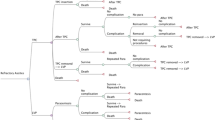Abstract
Purpose
The aim of the study is to assess patient outcomes, complications, impact on rehospitalizations, and healthcare costs in patients with malignant ascites treated with tunneled catheters.
Materials and Methods
A total of 84 patients with malignant ascites (mean age, 60 years) were treated with tunneled catheters. Patients with peritoneal carcinomatosis and malignant ascites treated with tunneled drain catheter placement over a 3-year period were studied. Overall survival from the time of ascites and catheter placement were stratified by primary cancer and analyzed using the Kaplan–Meier method. Complications were graded by the Common Terminology Criteria for Adverse Events v3.0 (CTCAE). The differences between pre- and post-catheter admissions, hospitalizations, and Emergency Department (ED) visits, as well as related inpatient expenses were compared using paired t tests.
Results
There were no significant differences in gender, age, or race between different primary cancer subgroups. One patient (1 %) developed bleeding (CTCAE-2). Four patients (5 %) developed local cellulitis (CTCAE-2). Three patients (4 %) had prolonged hospital stay (between 7 and 10 days) to manage ascites-related complications such as abdominal distention, discomfort, or pain. Comparison between pre- and post-catheter hospitalizations showed significantly lower admissions (−1.4/month, p < 0.001), hospital stays (−4.2/month, p = 0.003), and ED visits (−0.9/month, p = 0.002). The pre- and post-catheter treatment health care cost was estimated using MS-DRG IPPS payment system and it demonstrated significant cost savings from decreased inpatient admissions in post-treatment period (−$9535/month, p < 0.001).
Conclusions
Tunneled catheter treatment of malignant ascites is safe, feasible, well tolerated, and cost effective. Tunneled catheter treatment may play an important role in improving patients’ quality of life and outcomes while controlling health care expenditures.






Similar content being viewed by others
References
Ayantunde AA, Parsons SL. Pattern and prognostic factors in patients with malignant ascites: a retrospective study. Ann Oncol. 2007;18:945–9.
Parsons SL, Lang MW, Steele RJ. Malignant ascites: a 2-year review from a teaching hospital. Eur J Surg Oncol. 1996;22:237–9.
Richard HM 3rd, Coldwell DM, Boyd-Kranis RL, Murthy R, Van Echo DA. Pleurx tunneled catheter in the management of malignant ascites. JVIR. 2001;12:373–5.
Sangisetty SL, Miner TJ. Malignant ascites: a review of prognostic factors, pathophysiology and therapeutic measures. World J Gastrointest Surg. 2012;4:87–95.
Keen A, Fitzgerald D, Bryant A, Dickinson HO. Management of drainage for malignant ascites in gynaecological cancer. Cochrane Database Syst Rev. 2010;. doi:10.1002/14651858.CD007794.pub2.
Courtney A, Nemcek AA Jr, Rosenberg S, Tutton S, Darcy M, Gordon G. Prospective evaluation of the PleurX catheter when used to treat recurrent ascites associated with malignancy. JVIR. 2008;19:1723–31.
Moore KP, Wong F, Gines P, et al. The management of ascites in cirrhosis: report on the consensus conference of the International Ascites Club. Hepatology. 2003;38:258–66.
Pascual S, Such J, Perez-Mateo M. Spontaneous bacterial peritonitis and refractory ascites. Am J Gastroenterol. 2000;95:3686–7.
Iyengar TD, Herzog TJ. Management of symptomatic ascites in recurrent ovarian cancer patients using an intra-abdominal semi-permanent catheter. Am J Hosp Palliat Care. 2002;19:35–8.
De Gottardi A, Thevenot T, Spahr L, et al. Risk of complications after abdominal paracentesis in cirrhotic patients: a prospective study. Clin Gastroenterol Hepatol. 2009;7:906–9.
Narayanan G, Pezeshkmehr A, Venkat S, Guerrero G, Barbery K. Safety and efficacy of the PleurX catheter for the treatment of malignant ascites. J Palliat Med. 2014;17:906–12.
Rosenberg S, Courtney A, Nemcek AA Jr, Omary RA. Comparison of percutaneous management techniques for recurrent malignant ascites. JVIR. 2004;15:1129–31.
Saiz-Mendiguren R, Gomez-Ayechu M, Noguera JJ, et al. Permanent tunneled drainage for malignant ascites: initial experience with the PleurX(R) catheter. Radiologia. 2010;52:541–5.
Tapping CR, Ling L, Razack A. PleurX drain use in the management of malignant ascites: safety, complications, long-term patency and factors predictive of success. Br J Radiol. 2012;85:623–8.
White J, Carolan-Rees G. PleurX peritoneal catheter drainage system for vacuum-assisted drainage of treatment-resistant, recurrent malignant ascites: a NICE Medical Technology Guidance. Appl Health Econ Health Policy. 2012;10:299–308.
Find A Code. http://www.findacode.com/. 2014.
Lungren MP, Kim CY, Stewart JK, Smith TP, Miller MJ. Tunneled peritoneal drainage catheter placement for refractory ascites: single-center experience in 188 patients. JVIR. 2013;24:1303–8.
McClellan M, McKethan AN, Lewis JL, Roski J, Fisher ES. A national strategy to put accountable care into practice. Health Aff (Proj Hope). 2010;29:982–90.
Funding
None.
Author information
Authors and Affiliations
Corresponding author
Ethics declarations
Conflict of Interest
All authors have no financial or other disclosures or relationship with any commercial organization that may have a direct or indirect interest in this manuscript.
Ethical Approval
All procedures performed in studies involving human participants were in accordance with the ethical standards of the institutional and/or national research committee and with the 1964 Helsinki declaration and its later amendments or comparable ethical standards.
Informed Consent
Informed consent was obtained from all individual participants included in the study.
Rights and permissions
About this article
Cite this article
Qu, C., Xing, M., Ghodadra, A. et al. The Impact of Tunneled Catheters for Ascites and Peritoneal Carcinomatosis on Patient Rehospitalizations. Cardiovasc Intervent Radiol 39, 711–716 (2016). https://doi.org/10.1007/s00270-015-1258-1
Received:
Accepted:
Published:
Issue Date:
DOI: https://doi.org/10.1007/s00270-015-1258-1




